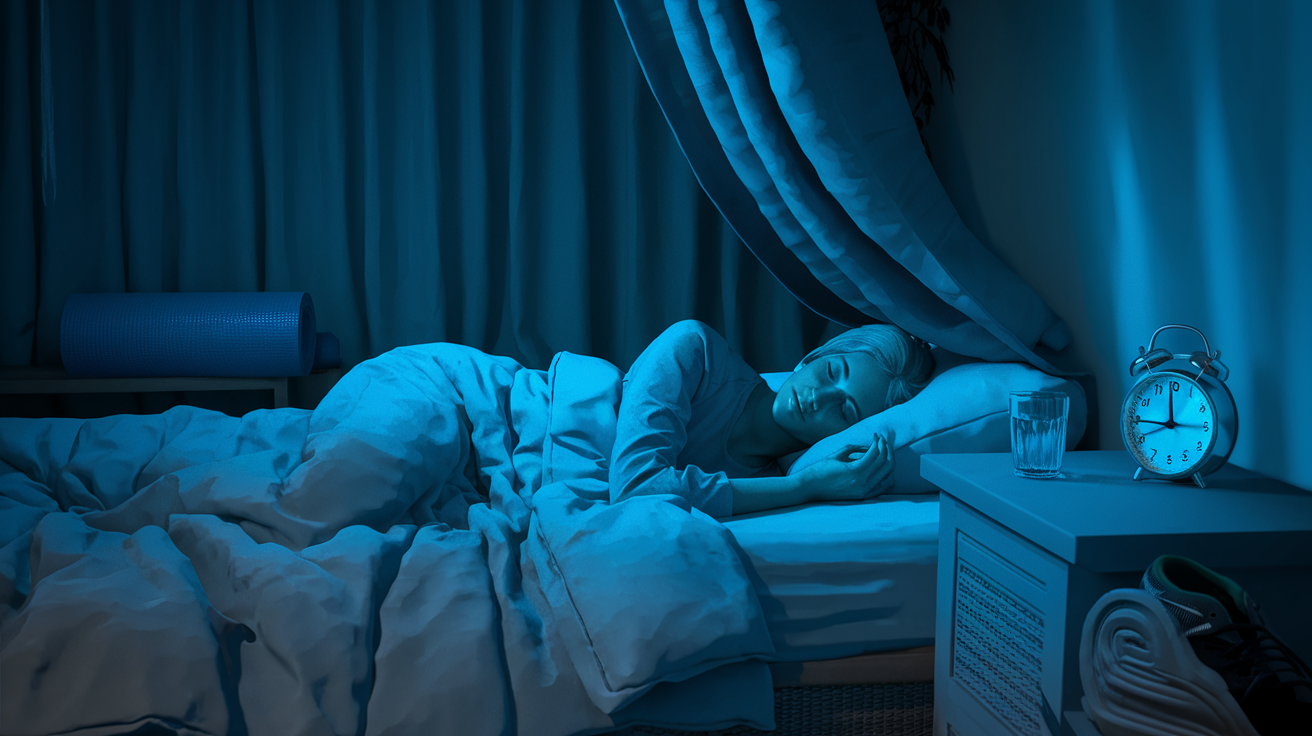Sleep for Fat Loss: The Definitive Blueprint to Master Your Metabolism
You’re eating clean, hitting the gym four times a week, and tracking your progress meticulously. Yet, despite your discipline, the number on the scale refuses to budge. You’re left frustrated, wondering what you’re doing wrong. What if the key to unlocking your fat loss goals isn’t on your plate or in the weights you lift, but in your bed? What if the missing link is the one-third of your life you spend unconscious?
This is not just another article about “getting more sleep.” This is a definitive playbook that demystifies the complex science behind weight management. Drawing on robust data from leading scientific institutions, we will show you precisely how sleep hormonally dictates fat loss. Poor sleep doesn’t just make you tired; it creates a biological environment where fat loss is nearly impossible, actively working against your best efforts in the kitchen and the gym.
This guide provides the knowledge and the strategy you’ve been missing. By the end, you will understand the hidden science sabotaging your progress and possess a step-by-step framework to turn your sleep into your most powerful metabolic advantage. You’ll learn how to improve sleep quality for weight loss, starting tonight. Your metabolic reset is waiting.
Table of Contents
- The Hidden Science: How Sleep Deprivation Hormonally Blocks Fat Loss
- The Physiology of Failure: Why Tired Bodies Don’t Lose Fat
- The Actionable Blueprint: Your 7-Day Sleep Optimization Challenge for Fat Loss
- Case Study: How Sarah Broke Her Weight Loss Plateau
- Conclusion
- FAQ: Your Sleep for Fat Loss Questions Answered
The Hidden Science: How Sleep Deprivation Hormonally Blocks Fat Loss
To understand why a good night’s sleep is non-negotiable for fat loss, we must look at the invisible hormonal chaos that sleep deprivation creates. When you are sleep-deprived, your body isn’t just tired; it’s under biological siege. Key hormones that regulate hunger, stress, and energy storage go haywire, effectively programming your body to hold onto fat and crave the very foods that derail your progress. This isn’t about willpower; it’s about biochemistry.
The Hunger Games: How Sleep Affects Ghrelin and Leptin
Think of your hunger signals as a car’s accelerator and brake pedals. Ghrelin is the accelerator—the “go” hormone that tells your brain, “I’m hungry, eat now!” Leptin is the brake—the “stop” hormone that signals, “I’m full, you can stop eating.” When you get adequate sleep, these two hormones work in beautiful balance.
However, when you are sleep-deprived, this system collapses. Research consistently shows that lack of sleep causes ghrelin levels to spike while leptin levels plummet. Your foot is now slammed on the hunger accelerator with a malfunctioning brake. According to the U.S. Department of Agriculture, this hormonal imbalance not only increases feelings of hunger but also shifts your cravings toward high-carbohydrate, calorie-dense foods. This is the scientific reason you reach for a donut instead of an apple after a poor night’s sleep. Understanding how sleep affects ghrelin and leptin is the first step to reclaiming control. The simple act of getting enough sleep to reduce hunger can be more effective than fighting cravings all day.
The Stress-Fat Connection: Sleep and Cortisol Reduction for Weight Loss
Cortisol is your body’s primary stress hormone. In short, controlled bursts, it’s essential for survival. But when chronically elevated due to stressors like sleep deprivation, it becomes a major roadblock to fat loss. When you don’t get enough sleep, your body perceives it as a threat and goes into a state of high alert, flooding your system with cortisol.
This elevated cortisol sends a powerful signal to your body: “Store energy, because we are in crisis.” Unfortunately, this stored energy takes the form of fat, particularly visceral fat—the dangerous type that wraps around your abdominal organs. A scientific review in PMC on “The Metabolic Consequences of Sleep Deprivation” highlights this direct link, explaining how lack of sleep causes belly fat by promoting fat storage in the midsection. Effective sleep and cortisol reduction for weight loss is therefore critical. By prioritizing sleep, you naturally lower cortisol, telling your body it’s safe to exit survival mode and start burning fat again.
The Energy Crash: Sleep’s Crucial Role in Insulin Resistance
Insulin is the hormone responsible for shuttling glucose (sugar) from your bloodstream into your cells to be used for energy. When this system works efficiently, your blood sugar remains stable. However, sleep deprivation throws a wrench in this process.
Even a single night of poor sleep can impair your cells’ ability to respond to insulin, a condition known as insulin resistance. When your cells become resistant, glucose can’t easily get in, causing it to build up in your bloodstream. Your pancreas panics and pumps out even more insulin to try and force the glucose into the cells. This cycle of high blood sugar and high insulin is a disaster for fat loss. Your body interprets high insulin levels as a signal to stop burning fat and start storing it. A comprehensive 2015 review in PMC, titled “The Impact of Sleep and Circadian Disturbance on Hormones and Metabolism,” confirms that disrupted sleep is a significant driver of this metabolic dysfunction. Addressing sleep and insulin resistance is fundamental to ensuring the calories you consume are used for energy, not stored as fat.
The Physiology of Failure: Why Tired Bodies Don’t Lose Fat
Moving beyond hormones, the physical consequences of sleep deprivation create a body that is metabolically primed to fail at fat loss. Even with a perfect diet and a dedicated exercise routine, a tired body will sabotage your results by altering what it burns for fuel and how efficiently it operates. It’s a physiological battle that you can’t win without proper rest.
The Anabolic Switch: Lose Fat, Not Muscle, With Sleep
When you’re in a calorie deficit to lose weight, your body needs to decide where to get the extra energy it needs: from your fat stores or from your precious, metabolically active muscle tissue. Sleep is the deciding factor. Deep sleep is the primary window for the release of Human Growth Hormone (HGH), a powerful hormone that helps preserve muscle mass and promote fat utilization.
When you’re sleep-deprived, HGH production plummets. Your body enters a more catabolic (breakdown) state, making it far more likely to burn muscle for energy instead of fat. A groundbreaking study from UChicago Medicine vividly demonstrated this. Dieters on a calorie-restricted plan who were sleep-deprived lost 55% less fat and 60% more muscle mass than their well-rested counterparts, despite eating the same number of calories. This is the crucial difference: to lose fat not muscle with sleep is to ensure your weight loss is quality weight loss. Prioritizing rest is key for optimizing growth hormone release during sleep for fat loss and protecting your metabolism.
The Thermostat Secret: The Best Temperature to Sleep for Weight Loss
Here is an expert-level tip that goes beyond standard advice: controlling your room’s temperature can directly influence your metabolic rate while you sleep. Research has shown that the best temperature to sleep for weight loss is a cool 60-67 degrees Fahrenheit (15-19 degrees Celsius).
This isn’t just about comfort; it’s about biology. Sleeping in a cooler environment can enhance sleep quality by helping your body’s core temperature drop, a necessary step to initiate and maintain deep sleep. More excitingly, sleeping in a cool room may help activate brown adipose tissue (BAT), or “brown fat.” Unlike regular white fat that stores energy, brown fat is metabolically active and burns calories to generate heat. By creating a cooler sleep environment, you may be gently encouraging your body to burn more energy throughout the night. This is a simple but powerful strategy for how to improve sleep quality for weight loss and give your metabolism an overnight boost.
The Actionable Blueprint: Your 7-Day Sleep Optimization Challenge for Fat Loss
Knowing the science is half the battle; applying it is how you win. This section is your playbook. Forget generic tips—this is a step-by-step framework you can implement immediately to transform your sleep and unlock your fat loss potential. We’ve framed it as a 7-day challenge to build momentum and create lasting habits.
Step 1: Lock in Your Sleep Schedule (Even on Weekends)
Your body runs on an internal 24-hour clock called the circadian rhythm, which governs the release of nearly every hormone we’ve discussed—ghrelin, leptin, cortisol, and growth hormone. A consistent sleep-wake cycle is the single most powerful signal you can send to keep this rhythm calibrated.
- Your Action: For the next seven days, go to bed and wake up at the same time every single day, including the weekend. Aim for 7-9 hours of sleep. A consistent sleep schedule for fat loss stabilizes your hormones, reduces hunger-inducing ghrelin, and optimizes cortisol patterns, creating a predictable environment for your body to feel safe enough to burn fat.
Step 2: The “Power Down” Hour: A Pre-Sleep Ritual to Lower Cortisol
You can’t expect your body to go from 100 to 0 in five minutes. The hour before bed is a critical transition period to signal to your body that the day’s stress is over and it’s time to rest and repair. The goal is to consciously lower cortisol levels.
- Your Action: Designate the 60 minutes before your scheduled bedtime as your “Power Down” hour. During this time: no screens (the blue light suppresses melatonin and keeps cortisol elevated), dim the lights, and engage in a calming activity. This could be reading a physical book, gentle stretching, meditation, or taking a warm bath. This ritual is a direct intervention for sleep and cortisol reduction for weight loss, telling your brain to switch from “fight or flight” to “rest and digest.”
Step 3: Optimize Your Environment for Deep Sleep
Your bedroom should be a sanctuary for sleep, optimized to eliminate disruptions that can pull you out of the deep, restorative stages needed for growth hormone release and muscle preservation. A recent scientific review highlighted how critical environmental factors are and how sleep deprivation impacts fat loss.
- Your Action: Turn your bedroom into a sleep cave.
- Cool: Set the thermostat between 60-67°F (15-19°C).
- Dark: Use blackout curtains, cover or remove electronics with lights, and consider an eye mask. Absolute darkness is key for optimal melatonin production.
- Quiet: Use a white noise machine or earplugs to drown out disruptive sounds.
These steps aren’t just about comfort; they are strategies for how to improve sleep quality for weight loss by maximizing the time your body spends in the deepest, most metabolically beneficial sleep stages.
Case Study: How Sarah Broke Her Weight Loss Plateau
To see these principles in action, let’s look at a common scenario. This story demonstrates the real-world power of prioritizing sleep.
The Problem: “Healthy” and Exercising, but Gaining Weight
Sarah, a 45-year-old marketing manager, was the picture of frustration. She was diligent, working out four times a week with a mix of cardio and weights, and had been tracking her calories, focusing on lean protein and vegetables. Yet, for the past six months, the scale hadn’t budged. Worse, she noticed she was gaining stubborn belly fat and felt constantly tired and reliant on coffee. Her evenings were often spent catching up on work emails or scrolling on her phone, leading to an inconsistent bedtime of around midnight, with a 6 AM alarm for her morning workout.
The Solution & Results: The Sleep Blueprint in Action
Instead of overhauling her diet or exercise again, Sarah committed to the 7-Day Sleep Optimization Challenge. Her primary focus was on two key changes. First, she set a strict 10:30 PM bedtime and 6:30 AM wake-up time—every single day. Second, she implemented the “Power Down” Hour. At 9:30 PM, her phone was plugged in across the room, the TV went off, and she spent the time reading a novel under a dim lamp.
The results were faster and more profound than she expected. Within the first week, her afternoon cravings for sugary snacks vanished. She felt more energized during her workouts and less reliant on caffeine. At the end of three weeks, without changing a single thing about her diet or exercise routine, Sarah had lost 2 pounds of fat. The puffiness in her face and midsection was visibly reduced, and for the first time in months, she felt in control of her health journey.
Conclusion
For too long, we’ve treated sleep as a luxury rather than a biological necessity. It’s time to stop blaming your diet or your workout when you hit a plateau. The science is definitive: poor sleep creates a hormonal environment that makes fat loss nearly impossible. It spikes your hunger, elevates your stress hormone, cripples your ability to process sugar, and even forces your body to burn muscle instead of fat. You cannot out-train or out-diet a bad night’s sleep.
You now have the complete playbook. You have moved beyond generic advice and understand the science of why your efforts may have stalled. More importantly, you have the actionable blueprint for how to fix it. You know how to regulate your hunger hormones, lower fat-storing cortisol, and protect your precious muscle mass—all while you are sleeping. The power to reset your metabolism and finally see the results you work so hard for is within your grasp.
Your metabolic reset begins tonight. Download our “7-Day Sleep Optimization Challenge for Fat Loss” checklist and start turning your sleep into your greatest fat-loss asset. The journey to a leaner, more energetic you doesn’t start in the gym tomorrow; it starts in your bed tonight.
FAQ: Your Sleep for Fat Loss Questions Answered
What is the single most important change I can make to my sleep for fat loss?
Consistency. The single most impactful change is to establish a consistent sleep-wake schedule, even on weekends. This stabilizes your circadian rhythm, which in turn regulates the hormones (ghrelin, leptin, cortisol) that control hunger, stress, and fat storage. Going to bed and waking up at the same time every day is the foundation upon which all other sleep improvements are built.
How exactly does lack of sleep cause belly fat?
Lack of sleep increases the production of the stress hormone cortisol. Chronically high cortisol levels signal your body to store fat, and it has a particular preference for storing it in the abdominal area as visceral fat. This is a primitive survival mechanism, as your body interprets sleep deprivation as a major stressor and tries to conserve energy reserves.
Will sleeping more make me lose weight even if I don’t change my diet?
Optimizing your sleep can lead to weight loss on its own, primarily because it helps rebalance the hormones that drive appetite and cravings. Many people find that when they are well-rested, they naturally eat less (especially fewer high-calorie junk foods) and have more energy for physical activity. A UChicago study found sleep-deprived individuals consumed an average of 270 more calories per day. By fixing your sleep, you may spontaneously create a calorie deficit. However, for best results, optimized sleep should be combined with a healthy diet and regular exercise.
How long does it take to see results after improving my sleep schedule?
You can feel the initial benefits, such as reduced hunger and better energy levels, within just a few days of improving your sleep consistency. Physical results, like a drop on the scale or a reduction in waist circumference, can often be seen within 2-4 weeks as your hormonal profile normalizes and your body becomes more efficient at burning fat.








